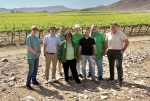It is not possible for a Minister to simply increase the Total Allowable Catch (TAC) outside or in contradiction to the scientific advice provided by Marine Resources Council (MRAC) despite calls by the industry to do so, fisheries and marine resource minister, Derek Klazen has said adding that doing so is not only un-sustainable but also outside the confines of our laws and policies.
Klazen was responding to fishing industry calls to increase TAC amid poor winter catches experienced by Lüderitz based fishermen last winter, the increased costs of doing business and other considerations.
“I started off by telling you about the President’s trip to the Arab Republic of Egypt as a means to underscore the importance of the sustainable exploitation of marine resources, prevention of bio-diversity loss and why coastal economies like Namibia should implement robust climate mitigating measures for a reason.
“It is sadly a global fact that the health of our ocean is declining and coastal countries are urged to look at implementing remedial steps to restore the health of the ocean. Issues of financial needs required to help countries like Namibia achieve the ambitious 30 by 30 protections (30% ocean and 30% land) remains an important factor,” Klazen said at the fish industry annual address last week further stating that as such, the important consideration when it comes to fisheries resource management is sustainability.
“In our case the sustainable harvesting or exploitation of marine resources is provided for in fisheries management policies and in the Marine Resources Act, Act 27 of 2000 as amended. As an Example, this law requires the Minister to consult the Marine Resources Council (MRAC) when determining together with Cabinet, the Total Allowable Catch (TAC) for a specific species on the best scientific advice available from MRAC,” explained Klazen before saying “However, I must say I sympathise with all of you in all honesty but my job is to choose between meeting your economic needs and expectations right now and compromise the fisheries stocks or preside over an industry that protects the fishing interests of future generations.”
LABOUR CONCERNS
During this session, the CEO of the National Fishing Corporation of Namibia (Fishcor) Alex Gawanab expressed his concern about the foreseeable job losses looming towards Lüderitz’s fishing industry as salary negotiation will soon commence.
Gawanab brought to the attention of Klazen the high cost of fuel, transport to Walvis Bay for export and other costs. He then called on Klazen to engage labour unions to prevent the catastrophic impact of an industrial action should the salary negotiation between employees and the fishing companies reach a deadlock.
He alleged that there is a misconception within the Unions and workers that when fishing quotas are awarded they for the benefit of workers instead of the operation and management of the companies.
Klazen echoed the sentiment that fishing quotas are allocated to fishing companies to sustain employment and contribute to the economy of the country while running their daily operations. Klazen further advised the fishing companies to be transparent during the salary negotiations with the Unions. “Open your books and show the unions. The unions are within their rights to demand for better wages and working conditions for their members’’ he remarked
Also speaking at the same session, Councillor of ǃNamiǂNûs Constituency Susan Ndjaleka, said the Luderitz Town Council is looking into ways to settle labour unrest in the town by hosting a workshop between the Ministry of Labour, workers unions, the workers and the fishing industry to find possible solutions and co-operation in this regard. “Letters has already been sent to the Ministry of Labour, and we are waiting for the Ministry to confirm the date for us to workshop this. We will unpack the labour unrest here and deal with our problems ourselves”, she informed the meeting.
CHILLING WARNING
In 2016, the Ministry of Fisheries and Marine Resources commenced with The Deep-Sea Reef Exploration Project. This project was started with three main objectives, namely to alleviate over-crowding at shallow Rock Lobster fishing grounds (accessed by the commercial Lobster fleet during the conventional Rock Lobster fishing season being November to April); to extend the Rock Lobster fishing season by targeting the male component of the stock in deeper water while female Rock Lobsters are nursing their eggs in shallower water during the May to October Berry season closure and to locate and map deeper Rock Lobster reefs for targeted future scientific research.
Although phase 1 of this Project ran from 2016-2021 with limited results, the DSRE Project was reactivated and ran again under phase 2 from 2022-2024
All or any interested Rock Lobster Fishermen intending to partake in this project could do so provided they installed a Vessel Monitoring System (VMS) on board their vessels as a means to collecting accurate and real-time Global Positioning System (GPS)data during fishing activities and further that no fishing was to take place in water depths shallower than 54.1 meters
“I must say that the results from a full-compliance point of view have been rather disappointing as we have seen from the compiled report a worrying trend amongst vessel crew members who partook in this project, aimed at falsifying the exact areas of catches and ultimately providing misleading and untruthful data to this project.
“Having been made alive to this fact I want to therefore say that those boat owners or crew members making themselves guilty of transgressions are reminded that their actions are not only outside the norms of this society but that they will face severe punishment while by the same token I am discouraging any future transgressions,” Klazen warned.










